

*Paywall: The Business of Scholarship. *Open Access Explained! Open Access 101 clip. UNESCO, WHO and the UN High Commissioner for Human Rights call for “open science” Acknowledging “the power of scientific cooperation and diplomacy to unite nations” Scientific discoveries and advances must be shared, according to the Declaration in favour of “open science”, science that is unhindered by barriers and frontiers, which was made jointly on 27 October by the United Nations Educational, Scientific and Cultural Organization (UNESCO), the World Health Organisation (WHO) and the Office of the United Nations High Commissioner for Human Rights (OHCHR).
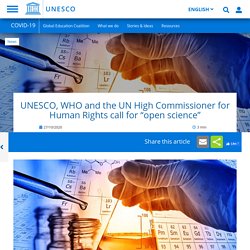
Six Questions (with Answers!) about UC's and Elsevier's New Transformative Deal. By now, I’m guessing that every Scholarly Kitchen reader is aware that after renewal negotiation bogged down for months and then culminated in the cancellation of all Elsevier subscriptions in February 2019, the University of California (UC) and Elsevier have now announced a new transformative deal that includes discounted open access (OA) publishing for UC authors and full online access to virtually all Elsevier journals for the UC community.
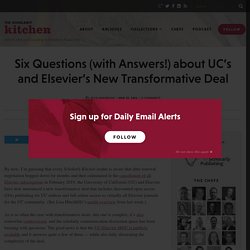
(See Lisa Hinchliffe’s useful overview from last week.) As is so often the case with transformative deals, this one is complex; it’s also somewhat controversial, and the scholarly communication discussion space has been buzzing with questions. The good news is that the UC-Elsevier MOU is publicly available and it answers quite a few of them — while also fully illustrating the complexity of the deal. Here I’d like to focus on six questions that I’ve had about the new UC-Elsevier deal, and share the answers I was able to find.
Plan S Principles. The Funders encourage governments, universities, research organisations, libraries, academies, and learned societies to align their strategies, policies, and practices, notably to ensure transparency.
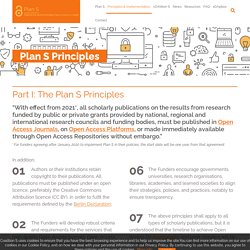
The above principles shall apply to all types of scholarly publications, but it is understood that the timeline to achieve Open Access for monographs and book chapters will be longer and requires a separate and due process; The Funders do not support the ‘hybrid’ model of publishing. However, as a transitional pathway towards full Open Access within a clearly defined timeframe, and only as part of transformative arrangements, Funders may contribute to financially supporting such arrangements; Open Access: A Look Back. Open Access Week 2018 has begun, and as happens each year, I’m never quite sure how The Scholarly Kitchen should (or shouldn’t) participate.

This blog has long (unfairly, in my opinion) been cast as “the enemy” of open access (OA). The reality is, as with most things OA, more complex once you get past the sloganeering. To me, the questions have never been about the concept behind OA (more availability of high quality information is a good thing for the world), but rather the implementation. We’ve been stuck in something of a loop for the last decade, knowing that OA is a good idea, but never getting past flawed ways to put it into action (author-pays Gold OA, which merely shifts the point of inequity from the reader to the author; Green OA which, if efficiently implemented threatens to destroy the subscription journals upon which it relies; and an insistence on one-size-fits-all policies). Open Access - SPARC. Research provides the foundation of modern society.
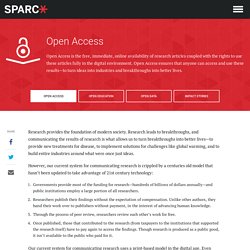
Research leads to breakthroughs, and communicating the results of research is what allows us to turn breakthroughs into better lives—to provide new treatments for disease, to implement solutions for challenges like global warming, and to build entire industries around what were once just ideas. However, our current system for communicating research is crippled by a centuries old model that hasn’t been updated to take advantage of 21st century technology: Governments provide most of the funding for research—hundreds of billions of dollars annually—and public institutions employ a large portion of all researchers.Researchers publish their findings without the expectation of compensation.
Our current system for communicating research uses a print-based model in the digital age. Archivists Are Trying to Make Sure a ‘Pirate Bay of Science’ Never Goes Down. Preprinting a pandemic: the role of preprints in the COVID-19 pandemic. Pirate website Sci-Hub is making the world’s academic research free to all. But at what cost? Hitting a paywall is a regular occurrence for those trying to read the latest research study.
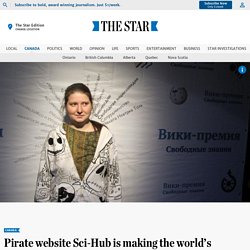
But now anyone with internet can access for free almost all the scholarly research produced in the world. That solution, however, involves using a database of pirated research papers known as Sci-Hub. It hosts more than 60 million papers with half a million downloads per day. Before Sci-Hub, you had to pay roughly $40 for each article, unless you attended a university willing to pay the millions required for bundled journal subscriptions. Open Access. Open access literature is digital, online, free of charge, and free of most copyright and licensing restrictions. There’s an incredible amount of scientific research conducted at universities and institutions around the world.
Historically, the findings of this research have been published in scholarly journals. *Covid-19 Shows Scientific Journals Like Elsevier Need to Open Up. The Potential Role Of Open Data In Mitigating The COVID-19 Pandemic: Challenges And Opportunitiesh (HealthAffairs) Archivists Are Trying to Make Sure a ‘Pirate Bay of Science’ Never Goes Down. Preprinting a pandemic: the role of preprints in the COVID-19 pandemic. *on information privilege. – info-mational (Char Booth) The concept of information privilege situates information literacy in a sociocultural context of justice and access. Information as the media and messages that underlie individual and collective awareness and knowledge building; privilege as the advantages, opportunities, rights, and affordances granted by status and positionality via class, race, gender, culture, sexuality, occupation, institutional affiliation, and political perspective.
In an extended period of relative disengagement with writing I have started and stopped and restarted this post so many times that it’s become a bit ridiculous, but based on the interest generated by discussions of information privilege in my teaching and speaking contexts it’s clearly time to finish. Information privilege in practice. Update on open access and academic journal contracts: a presentation to the UC Board of Regents' Academic and Student Affairs Committee - Office of Scholarly Communication. Ask the Community (and Chefs): How Can We Achieve Equitable Participation in Open Research? Alison Mudditt, Scholarly Kitchen Chef, CEO the Public Library of Science (PLOS) Looking back at both my response and others’ reactions to this same question two years ago, I’m somewhat frustrated by our collective lack of progress.
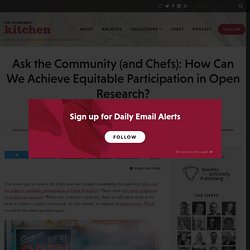
We’ve continued to advance towards a future in which the research literature is fully and immediately open (although we’re still arguing about exactly how to get there). But, as I’ve maintained before, the increasing focus on so-called “transformative” deals risks locking in both the high cost and market power of the subscription model. And this focus does little, if anything, to address the fundamental challenge of who gets to participate – better funded and wealthier disciplines, institutions, and countries retain their privileged position at the top of the heap. Preprint. Syndication Success: A Report from the Springer Nature and ResearchGate Pilot. Today, ResearchGate and Springer Nature are jointly announcing the findings of their syndication pilot.
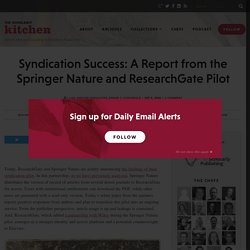
In this partnership, as we have previously analyzed, Springer Nature distributes the version of record of articles from several dozen journals to ResearchGate for access. Users with institutional entitlements can download the PDF, while other users are presented with a read-only version. Today’s white paper from the partners reports positive responses from authors and plan to transition this pilot into an ongoing service. From the publisher perspective, article usage is up and leakage is contained. And, ResearchGate, which added a partnership with Wiley during the Springer Nature pilot, emerges as a stronger identity and access platform and a potential counterweight to Elsevier.
Findings from the Pilot Syndication Partnership Highlights from the findings reported by the syndication partners and their planned next steps include: Impact. The Truth Is Paywalled But The Lies Are Free ❧ Current Affairs. Paywalls are justified, even though they are annoying.
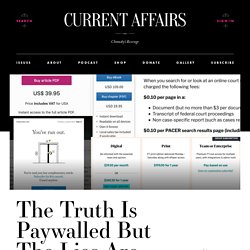
It costs money to produce good writing, to run a website, to license photographs. A lot of money, if you want quality. The Evolving Role of Preprints in the Open Access Publishing Landscape. *University Research Should Be Free to All (Janet Napolitano) Since the novel coronavirus struck, scientific research has been shared, and built upon, at an unprecedented pace.
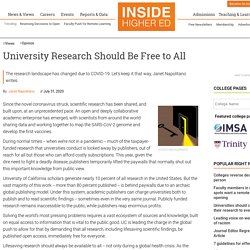
An open and deeply collaborative academic enterprise has emerged, with scientists from around the world sharing data and working together to map the SARS-CoV-2 genome and develop the first vaccines. During normal times -- when we’re not in a pandemic -- much of the taxpayer-funded research that universities conduct is locked away by publishers, out of reach for all but those who can afford costly subscriptions.
This year, given the dire need to fight a deadly disease, publishers temporarily lifted the paywalls that normally shut out this important knowledge from public view. University of California scholars generate nearly 10 percent of all research in the United States. But the vast majority of this work -- more than 80 percent published -- is behind paywalls due to an archaic global publishing model. But this is just the start. Seeking Sustainability: Publishing Models for an Open Access Age.
Last week I had the privilege of serving as the keynote speaker for “Seeking Sustainability: Publishing Models for an Open Access Age.” This virtual event was originally developed as a preconference for the annual UKSG conference, which like so many events was cancelled to help fight the global pandemic. This piece is a reconstruction of my remarks, highlighting the main points that are on my mind as I think about open access, business models, and sustainability. My slides are available via my university’s repository.
My Multiple Perspectives. *The Privileged Link: Open Access, Version of Record, or Let the User Decide? Focusing on Value - 102 Things Journal Publishers Do (2018 Update) The first version of this list was created back in the summer of 2012, at a time when publishers were being challenged repeatedly to prove they added value beyond managing peer review and some basic copy editing and formatting. The first post outlined 60 things publishers do. The post was revised again in 2013 to reflect 13 more things, bringing the total to 73. Guest Post: Kent Anderson UPDATED — 96 Things Publishers Do (2016 Edition) Editor’s Note: If you’re reading this blog, you likely know who Kent Anderson is. What you might not know is that Kent recently hung out his own shingle as an independent publishing consultant, starting Caldera Publishing Solutions.
Kent now also has his own blog at the site, and it’s worth checking regularly. Roadblocks to Better Open Access Models. The Scholarly Kitchen will be making an appearance at this year’s Frankfurt Bookfair. Plan S Open Letter: Reaction of Researchers to Plan S: Too Far, Too Risky. In September 2018, a group of European government funding agencies announced the creation of cOAlition S, an organization created to implement “Plan S,” an initiative designed to ensure that “by 2020 scientific publications that result from research funded by public grants provided by participating national and European research councils and funding bodies, “must be published in compliant Open Access Journals or on compliant Open Access Platforms.” [1] Plan S is built on ten principles, which include: • A requirement that authors of funded research publications assign all of their copyright prerogatives (including republication, commercial use, and the creation of derivative versions) to the general public.
Plan S and Humanities Publishing. *How Unpaywall is transforming open science. On tearing down information walls. It’s been a tough week. I lost two friends. What are Academic Book Publishers for? Part 1 (Scholarly Kitchen) Digital Textbooks Are Forcing a Radical Shift in Higher Ed. Can I Buy Half of a Subscription Database? Beginning with a disclaimer is probably the best way to start off an article about the rising cost of subscription databases.
*Open Access For Libraries. Open Access Scholarly Publishers Association. Library Publishers Convene in Vancouver to Discuss Open Platforms and Open Educational Resources. Carling et al (2018) At the crossroads of open access to research. UC terminates subscriptions with world’s largest scientific publisher in push for open access to publicly funded research - Office of Scholarly Communication. This announcement is cross-posted from the University of California Press Room. As a leader in the global movement toward open access to publicly funded research, the University of California is taking a firm stand by deciding not to renew its subscriptions with Elsevier. *Will the world embrace Plan S, the radical proposal to mandate open access to science papers? Resolved: All scholarship must be made freely available for reading and reuse (2018 Hyde Park Debate)
Think Sci-Hub is Just Downloading PDFs? Think Again. Editor’s Note: Today’s post is by Andrew Pitts, Co-Founder and CEO of PSI, and is based on the talk he gave at the 2018 Society for Scholarly Publishing (SSP) Annual Meeting. Back in March, Scholarly Kitchen Chef and NISO Executive Director Todd Carpenter wrote a post titled, “FBI Indicts Nine Iranians in a Massive Scheme to Target Academic Credentials and Steal Content.” It was about the U.S. It’s time for science to embrace open access. EBSCO & Open Access. Open-access plan draws online protest. Hundreds of scientists are pushing back against Plan S, a plan to crack down on scholarly journals’ paywalls, launched 2 months ago by 11 national research funders in Europe.
What Is “Open Access”? More about open citations — Citation Gecko, Citation extraction from PDF & LOC-DB. Dataset Search. Google Public Data Explorer. Open peer review, innovative dissemination and altmetrics: OpenUP Final Conference. Open Data Sets by Topic - Open Data Collections - SJSU Research Guides at San José State University Library. American Libraries Live—Open Access 2020: Looking at the Future (June… General Overview - Open Educational Resources (OER) - Subject Guides at Binghamton University Libraries. Locking the Web Open, a Call for a Distributed Web. SAGE Journals: Your gateway to world-class journal research. General Overview - Open Educational Resources (OER) - Subject Guides at Binghamton University Libraries. Open Access Policies: An Introduction from COAPI. Guest Post - What are Academic Book Publishers for? Part 2.
Erica Stone: Academic research is publicly funded. Research Shows That Published Versions Of Papers In Costly Academic Titles Add Almost Nothing To The Freely-Available Preprints They Are Based On. Clay Shirky: Can Open Source Be Traced To The 17th-Century? EBSCO Open Dissertations Project - Join the Movement. Wikimedia Research/Showcase. EBSCO and BiblioLabs Announce OA Service for Theses, Dissertations.
Access vs. Accessibility in Scholarship and Science. Fifty shades of open. Putting the OA into interlibrary loan – openaccessbutton. The cathedral and the bazaar. Academic Publishing is Headed for a Day of Reckoning. The State of OA. *Openness as social praxis. Scholar. Copyright: the immoveable barrier that open access advocates underestimated (Please skim) Public Access to Publicly Funded Materials: What Could Be. Getting serious about open access discovery — Is open access getting too big to ignore?
Open Access and Author Fees - Where to Publish Your Research - LibGuides at Duquesne University. Free full-text scholarly articles. Authors - Open Access Publishing - Open Access Publishing and Resources - Guides at Dahlgren Memorial Library.